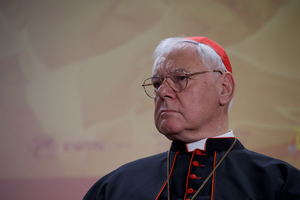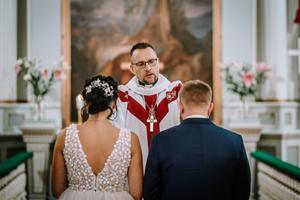Synod’s Final Report Lacks Bishops’ Consensus on Controversial Topics
The synod fathers agreed with a 2/3 majority to all 62 paragraph in synod report except those on communion for the divorced and “remarried” and on welcoming homosexuals.
VATICAN — In an electronic vote this afternoon, the synod fathers approved the final report — relatio synodi — of the synod of bishops, with two paragraphs on administering holy Communion to divorced and “remarried” couples and one on welcoming homosexuals failing to reach a two-thirds majority.
The final document of the Oct. 5-19 extraordinary synod on the family contains 62 points and the voting numbers for each of these was published. The most contentious paragraph, on allowing some remarried divorcees to receive communion after a period of penitence, received 104 votes in favor and 74 against.
A second paragraph on divorced and remarried persons, spiritual communion and a call to deepen understanding of this question received 112 votes in favor, 64 against — also failing to make obtain a two-thirds majority.
A third paragraph on the same issue, which states that situations of married divorcees “require careful reflection and respectful accompaniment, avoiding the kind of language and attitudes that may make them feel discriminated against,” received over a two-thirds majority (155 votes to 19).
A point on homosexuality received 118 votes in favor and 62 against. No longer did it say, as the interim report proposed, that homosexuals have gifts to offer the Church. Instead it says they must be “received with respect and gentleness” and that “every sign of unjust discrimination in their regard should be avoided.”
Another issues that received a large number of negative votes concerned cohabitation and the matter of declarations of nullity, commonly called annulments.
Aside from the three paragraphs that lacked the two-thirds majority, the other 58 points passed. Despite the lack of agreement on certain paragraphs, they were “not completely rejected,” Vatican spokesman Father Federico Lombardi told reporters today. “They cannot be considered an expression of synodal consensus”, he said, but rather show a “work in progress” and areas that “still have a ways to go.”
The fact that these three points remain in the document despite only having a “qualified majority” has surprised some observers. In common law in the Anglophone world, these paragraphs would be rejected from the final document. “This is moving into new territory,” a legal expert told the Register on condition of anonymity. “Where now is the legitimacy of these causes as an expression of the synod? They should be fully rejected.”
Father Robert Gahl, professor of moral philosophy at the Pontifical University of the Holy Cross in Rome, said that comments made from a senior synod official this week that “doctrine can change” is “confusing and unsettling for all Christians because our faith is received from the revelation of Jesus, not from the consensus from a group of bishops meeting in Rome.”
Pope Francis gave a closing speech in which he spoke of the need to have “animated discussions” and set our eyes at the good of the Church but without “ever putting into question the fundamental truths of the sacrament of marriage.”
He stressed that there is still a year before the ordinary synod of bishops, set to take place in October 2015, “to mature, with true spiritual discernment, the proposed ideas and to find concrete solutions to so many difficulties and innumerable challenges that families must confront.”
The final report was drafted by Cardinal Peter Erdo, general rapporteur of the synod, plus Cardinals Gianfranco Ravasi, Donald Wuerl, Msgr. Victor Manuel Fernandez, Msgr. Carlos Aguiar Retes, Msgr. Peter Kang U-ILL, Jesuit Father Adolfo Nicolas Pachon, South African Archbishop Wilfrid Napier and Australian Archbishop Denis Hart.
A full English translation of the final report will likely be published early next week.
















